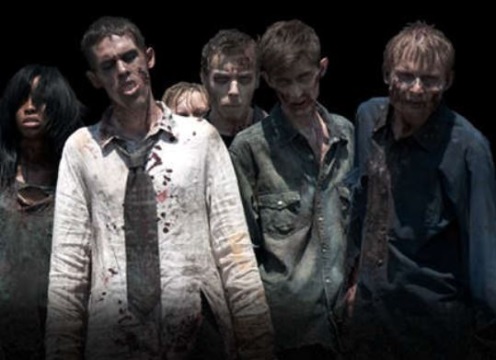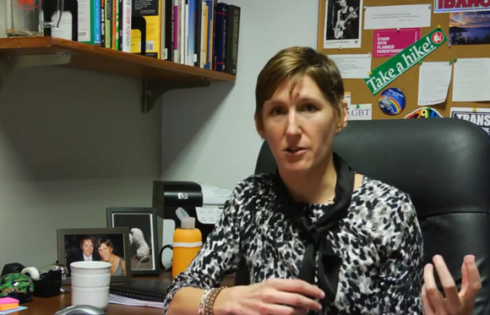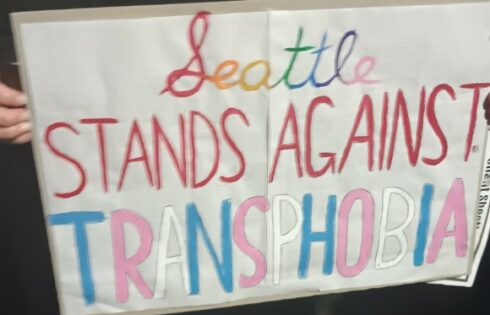
After the zombie apocalypse comes survival.
What should survivors eat? How best to defend and inoculate themselves? Where’s the best place to hide from the walking dead? Can humans handle the stress of running for their lives everyday?
These questions and many more will be answered through a new massive open online course that will look at issues and topics associated with the television show “The Walking Dead” on AMC, launched as a partnership between UC Irvine and the technology firm Instructure.
Entering its fourth season, “The Walking Dead,” the most watched television show among 18 to 49 year olds, follows a group of people who have survived a zombie apocalypse. The group, while trying to keep the zombies at bay, is forced to survive in an abandoned prison in addition to fighting off intruders as the country has entered total anarchy.
Professors set to teach the course have a wide range of experience and were chosen on their ability to integrate pop culture into the academic setting, a university official told The College Fix. The eight-week long MOOC – with a tagline “enroll and survive” – begins Oct. 14.
Melissa Loble, associate dean overseeing the course, called “Society, Science, Survival: Lessons From AMC’s The Walking Dead,” said the free class will address fictional situations found on the highly popular show, as well as real-life scenarios.
“We definitely wanted to include topics that were not just about the show, but that had real-world implications or applications,” Loble told The College Fix.
UC Irvine astronomy and physics Professor Michael Dennin says characters in The Walking Dead are faced with two issues in physics, preventing damage and causing it, so some of his lectures will explore that aspect.
“So, how realistic is the depiction of damage causes and protection in television, movies, and video games? Asking this question allows us to explore fundamental ideas of physics: energy, momentum, and forces,” Dennin says on the course’s website, adding he will also explore concepts like precision and accuracy specifically related to weapons and protection.
Sarah Eichhorn, assistant vice chairwoman for undergraduate studies in mathematics, says there’s a good deal that can be learned about math from the show. Her portion of the course will focus on the mathematics of survival.
“(We’ll look at) how mathematics can be used to model population dynamics and project future species survival or extinction. I’ll also show how mathematics could potentially help curb the spread of walker disease via a variety of interventions—vaccinations, treatments, cures, better weapons,” Eichhorn says on the website.
The social science portion of the course will feature Joanne Christopherson, a lecturer at UC Irvine. Students will learn about the social side of an apocalypse. Nevermind the zombies – what about the humans who are left?
“The zombies aren’t even the scariest characters in the show,” she states. “Each episode is rich with social issues: what it means to be human, the basis of social order, freedom and action, value judgments and human differences, and personal and social change.”
UC Irvine is no stranger to massive open online courses, or using pop culture in the classroom, but this is reportedly the first time a television network, university and tech firm have joined forces to create an online course for the public.
The course has an unlimited amount of seats. Thousands have already signed up, Loble said.
“We jumped at the opportunity to do this,” Loble said. “We love to experiment in the online learning space and think this is a great opportunity to expose participants to academic topics and study that they might not otherwise be exposed to as well as to the quality of learning UCI offers.”
The class, which offers video lectures and includes discussion forums, is expected to teach students how to: describe how infectious diseases—like a zombie epidemic—spread and are managed; apply various models of society and Maslow’s hierarchy of needs to existing and emerging societies as a means for understanding human behavior; analyze existing social roles and stereotypes as they exist today and in an emerging world; debate the role of public health organizations in society; describe how mathematical equations for population dynamics can be used to study disease spread and interventions; and summarize multiple methods for managing stress in disaster situations, according to the course’s website.
Fix contributor Kara Mason is a student at Colorado State University – Pueblo.
CLICK HERE to Like The College Fix on Facebook / TWITTER: @CollegeFix





Please join the conversation about our stories on Facebook, Twitter, Instagram, Reddit, MeWe, Rumble, Gab, Minds and Gettr.